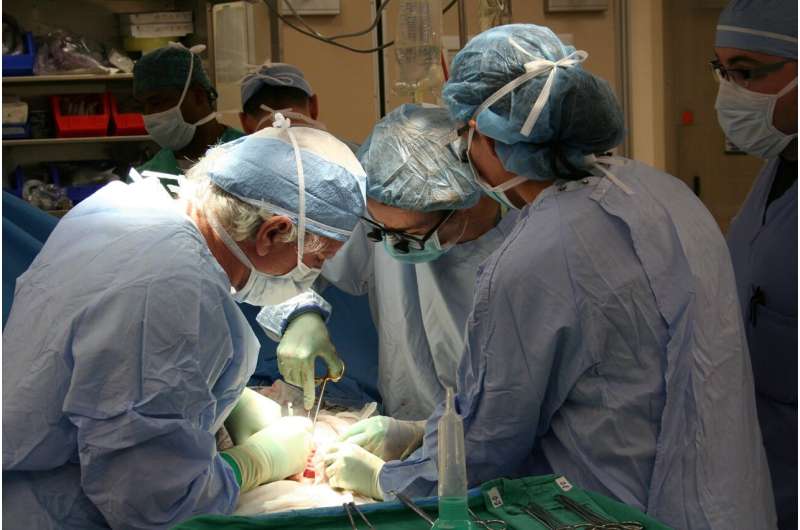This article has been reviewed according to Science X's editorial process and policies. Editors have highlighted the following attributes while ensuring the content's credibility:
fact-checked
peer-reviewed publication
trusted source
proofread
Liver transplant outperforms other therapies for colorectal cancer that has spread to the liver

Colorectal cancer often spreads to the liver, and for some patients, surgical removal of their liver tumors is not an option. A new study led by researchers at the Wilmot Cancer Institute and University of Rochester Medical Center (URMC) shows that a select group of patients with colorectal cancer that has spread to the liver tend to fare better if they receive a liver transplant as opposed to other common therapies.
In the study, published in JAMA Surgery, patients who had liver transplants tended to live longer without cancer progression than patients who opted for other treatments. While previous studies have shown the benefits of liver transplant for these patients, this is the first study to compare liver transplant to other treatment options.
"In any cancer treatment, it's very easy to describe the outcomes of the patients who received the intervention, but similar patients that did not undergo the intervention can serve as a good comparison," said Matthew Byrne, MD, a surgery resident at URMC and author of the study.
"Without randomized, controlled trial data, this study offers the best evidence that is available to understand whether liver transplant provides better outcomes over other treatments."
The study, led by Roberto Hernandez-Alejandro, MD, chief of Abdominal Transplant and Liver Surgery at URMC, followed 33 patients whose colorectal cancer was under control, but who had liver tumors that could not be surgically removed. All 33 patients were eligible for liver transplantation, but only 20 chose to have a transplant, while 13 opted for other classical therapies, like removal of part of the liver, chemotherapy, or liver-directed therapies.
Compared to the classical therapy group, the liver transplant group had significantly higher progression-free survival rates across three years of follow up. One year after a liver transplant, 90% of patients showed no signs of cancer progression. That number dropped to 73% after two years and to 36% in three years. On the other hand, only 42% of patients who opted for other therapies were cancer-progression-free after one year, which dropped to roughly 10% after two and three years.
The transplant group also had higher overall survival rates than the standard therapy group, though the difference wasn't statistically significant. At the three-year follow up, 90% of transplant patients had survived, compared to 73% of patients who received other therapies.
Though this study provides solid evidence, larger clinical trials will be needed to fully understand the added benefit of liver transplant compared to other treatments for these patients—and to better refine which patients benefit most.
"Unfortunately, liver transplantation is not for every single patient who has advanced metastatic disease in the liver," said Hernandez-Alejandro.
"The way we can have good results and help these patients is by establishing strict criteria based on tumor biology, the behavior of these tumors, how well they respond to chemotherapy. We only perform transplants for patients who are likely to have a good outcome."
More information: Matthew M. Byrne et al, Progression-Free Survival for Liver Transplant vs Alternative Therapy in Unresectable Colorectal Liver Metastasis, JAMA Surgery (2024). DOI: 10.1001/jamasurg.2024.2057


















